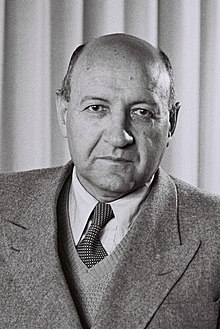Eliezer Kaplan
Eliezer Kaplan ( Hebrew אליעזר קפלן, Born 1891 in Minsk , Russian Empire ; died July 13, 1952 in Tel Aviv , Israel ) was a Zionist labor leader, Israeli politician ( Mapai , member of the 1st and 2nd Knesset ) and the first finance minister of the State of Israel.
Live and act
Kaplan was born in Minsk in what is now Belarus and received his training in Cheder , in the Russian high school in Łowicz and at the Technical University in Moscow . He finished his studies in 1917 with a degree in civil engineering . In 1920 he went to Eretz Israel . He was one of the leading figures of the Histadrut and was secretary of the Executive Committee from 1929 to 1933. From 1933 to 1948 he was a director of the Jewish Agency responsible for the distribution of funds. He was also Tel Aviv City Councilor from 1925–1933.
Kaplan was one of four representatives of the Jewish National Council who voted against the declaration of independence on May 14, 1948, but then signed it.
After the establishment of the State of Israel, Kaplan was appointed first finance minister. On July 30, 1948, he was able to announce the creation of his own Israeli currency: one Israeli pound was equivalent to about four US dollars. During his tenure, he was able to obtain the first loans from abroad that saved the Israeli market from collapse. In 1952 he planned the “New Economic Policy” and began implementing it. A few weeks before his death, he stepped down and was appointed Israel's first deputy prime minister. 1949–1950 he also served as Minister for Trade and Industry.
The Kaplan Hospital in Rechowot , the district of Qirjat Eliezer in Netanya , the Kaplan district in Kfar Saba and numerous streets in Israeli cities were named after him.
literature
- John F. Oppenheimer (Red.) And a .: Lexicon of Judaism. 2nd Edition. Bertelsmann Lexikon Verlag, Gütersloh u. a. 1971, ISBN 3-570-05964-2 , col. 365.
See also
Web link
| personal data | |
|---|---|
| SURNAME | Chaplain, Eliezer |
| ALTERNATIVE NAMES | אליעזר קפלן (Hebrew) |
| BRIEF DESCRIPTION | Israeli politician |
| DATE OF BIRTH | 1891 |
| PLACE OF BIRTH | Minsk |
| DATE OF DEATH | July 13, 1952 |
| Place of death | Tel Aviv |

